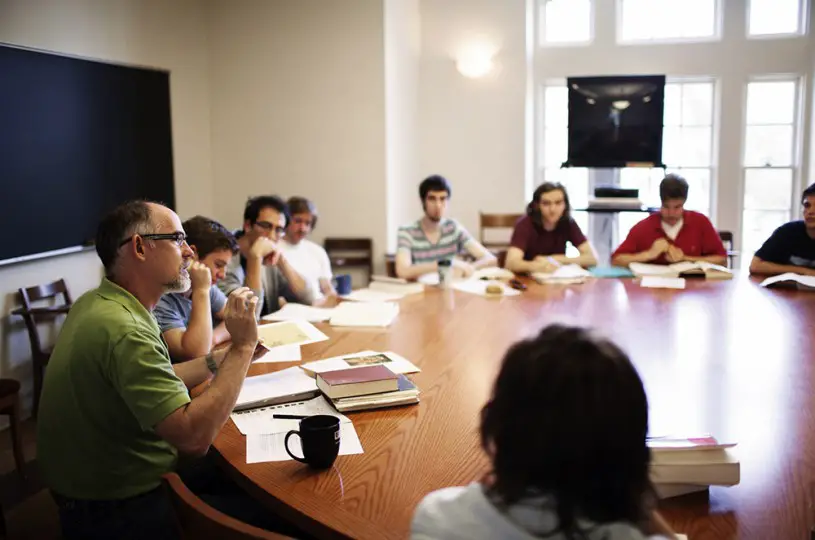An Academic Tradition
As Aristotle would have explained, ‘Educating the mind without educating the heart is no education at all.’
By Dakota E. Buhler, George Fox University
“We are sallying forth on an unrehearsed spiritual and intellectual adventure. See the world with new eyes.”
So concluded the final seminar of the inaugural year of the William Penn Honors Program at George Fox University. A year-and-a-half before, a handful of soon-to-be college students from across the globe had committed to the school’s brand new great books program with little-to-no-knowledge of what they were getting themselves into.
Some students had heard of the program from admissions counselors, some had stumbled upon it during tedious hours of online college searches and others heard of it through the grapevine of teachers, coaches and administrators. As it had never before existed, there were no precedents for the William Penn Honors Program; the only guarantee was that the students were going to read a lot of books.
And they applied anyway.
Now, three years into their four-year program, these same students are avid proponents of great books education. Socrates once famously said that “The unexamined life is not worth living,” something that great books programs take to heart. Students in colleges and universities across the United States can be found meeting in cohorts of ten-to-twenty students, sitting around a table and examining their lives through the eyes of writers like Socrates, who championed a holistic liberal arts education over two thousand years ago.

George Fox University’s honors program, when it was created, joined a larger community of great books programs across the nation. Universities such as Columbia, Boston College, the University of Texas at Austin and Kentucky State are all well known for their great books programs and take pride in the support and continuation of classical liberal arts education.
So what exactly is a great books education? Some of the earliest documented educational methods were recorded by Plato around 400 B.C., when the philosopher Socrates would ask a series of questions, the answers to which would be directed at a single moral or theoretical problem. This questioning, or dialectical mode of inquiry, became known as the Socratic Method. It essentially means that a person has to ask a lot of questions before discovering their underlying beliefs or cumulative knowledge of a topic.
Great books programs are founded on the Socratic Method. They generally consist of small cohorts that read through history’s most prominent Western writers, and then discuss the works in a Socratic style. The specific curriculum varies from program to program, but it generally includes authors who have been set apart as great philosophers, theologians, political theorists, scientific thinkers and literary geniuses of their times. These authors’ works become the core texts on which great books programs are built.
Despite the similarities between programs at a foundational level, each school’s great books program has its own structure and requirements. Some schools require rigorous applications and four-year commitments to their programs, while others provide great books opportunities for any interested student, for any amount of time. Most great books programs act as alternate general-education tracks within the larger college or university, but some allow interested students to spend their entire educational experience in a Socratic setting.
Boston College’s is constructed so that students may choose to take a great books class as a dual theology/philosophy requirement during their freshmen year. At the end of the year, interested students are given the option to apply to the Perspectives great books program. After admission, these students would continue their classical education and ultimately graduate with an honors major in the Perspectives program.
The University of Texas-Austin offers two separate Great Books paths—the first is an option for any student, and is “an introduction to the liberal arts through the study of the great books.” Their second program, the Jefferson Scholars Program, is more competitive and offers a rigorous, but rewarding journey through the history of great books. While this competitive program is on-par with an elite great books education, having two Socratic tracks provides all students with the option to pursue a great books experience.
Kentucky State University’s Whitney Young School of Honors and Liberal Studies includes three distinct great books tracks that vary by length and diploma type. Students in the program spend two years taking intensive classical education courses, including Greek or Latin linguistics, and then may choose to either apply for an Associate degree in Liberal Studies (honors option) or continue on to a Bachelor of Arts degree in Liberal Studies (honors option). As a third possibility, students are given the option to pursue a non-great books bachelor’s degree with the addition of a minor in liberal (great books) studies.
As two of the oldest recorded methods of education, Socratic dialectical inquiry and the great books movement have never completely gone out of style. They can be traced from the ancient world into the Middle Ages, through the Renaissance and into the modern educational system. Today they are making a gradual resurgence into America colleges and universities, and may soon be a commonplace within educational institutions of all sorts.
These programs are gaining attention and success because of their ingrained unification of various subjects. Great books authors combine philosophy and theology with math, science and politics, looking at the morality of human nature in a wide variety of times and contexts. Yes, a Biblical Studies major can learn from the medieval monastic writers, but so can a Business major or a Biochemistry major or a Journalism major. Great books open up universal questions, a fact that appeals to a wide variety of students.
An alumnus of Mercer University in Georgia gives a perspective on the value of a great books education, saying, “Great books has been one of the most valuable experiences in my life. It provided me with the opportunity to read some of the greatest books ever written, as well as to explore the way that other peoples’ experiences intersected with the important lessons of whatever book we were reading.” Similarly, a University of Texas student explains that “Studying core texts has been so helpful in learning how to critically examine what I once took for granted.”
Students in great books programs are participating in the same educational techniques that were in practice two thousand years ago, but the questions and discussions remain relevant. Socratic discussions prioritize critical thinking and encourage students to apply some of the most intellectually debated questions in history to their own lives.
What constitutes justice? How do we achieve the good life? What is the right way to love one another? How can we be happy while we are suffering? How much emphasis should we place on action, and how much should we place on contemplation? What is the role of government? How does science interact with religion? How do we find absolute truth?
These are just some of the questions that great books students must ask on a regular basis, but they are not as nebulous and intangible as they may seem. Students of all majors can benefit from an interest in philosophy, politics and scientific thought, and though certain areas will always interest particular students more than others, the combination leads to a highly fulfilling education.
The holistic focus of a great books education that aims to educate the heart and mind simultaneously, appeals to a variety of students. This widespread interest is creating incredibly successful great books programs because, as Aristotle once claimed, “Educating the mind without educating the heart is no education at all.”










I very much enjoyed this lucid, well-written article. We have, in the Georgia College Honors Program, “Great Ideas” honors sections of core curriculum classes that take big, enduring themes and challenges in human history, and examine these through Great Global Books, which would include non-Western authors. You of the great benefits of this approach is the acquisition of deep reading and deep comprehension skills.
[…] If you are interested in reading more about trends in college-level socratic seminars, I wrote this article for studybreaks magazine after my junior year of […]